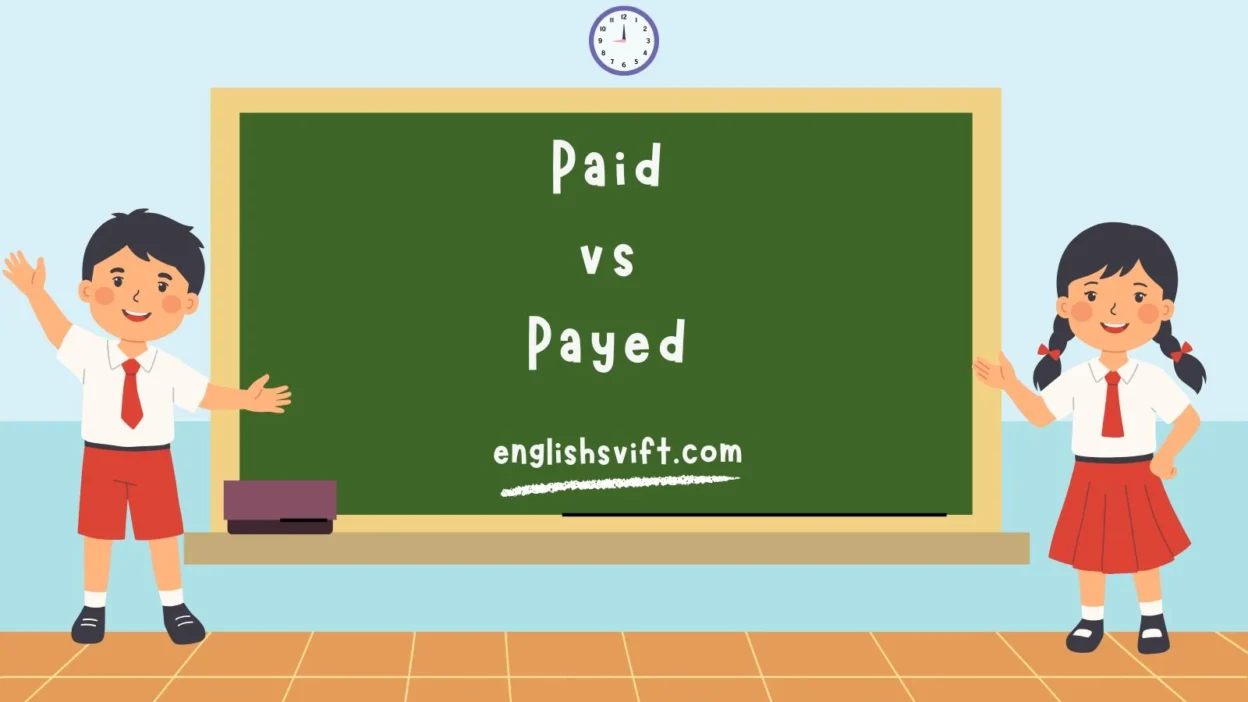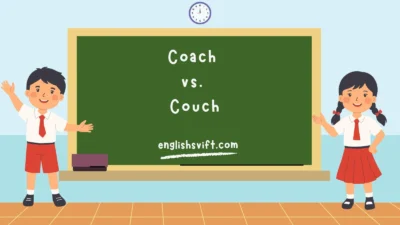English can be tricky, especially when it comes to words that sound similar but mean different things. Paid and payed are classic examples. Many writers, students, and even professionals get confused, wondering which word to use in their sentences.
By the end of this guide, you’ll confidently know the difference, understand the origins, and use each word correctly in both everyday and specialized contexts.
Understanding the Core Difference Between Paid and Payed
At its core, the distinction is simple:
- Paid → the past tense and past participle of the verb pay, mostly used in financial transactions.
- Payed → rarely used, mostly in nautical contexts, referring to coating or sealing a ship’s seams.
Think of it this way: if money is involved, it’s paid. If a ship is being treated with tar or resin, it’s payed.
Why People Commonly Confuse Paid and Payed
Confusion arises because:
- They sound almost identical when spoken.
- The irregular verb pay has different forms in different contexts.
- Spell checkers like Grammarly sometimes flag one but not the other, depending on the context.
For example:
“I paid my bills yesterday.” ✅
“The crew payed the ship’s seams with tar.” ✅
The Verb Pay: Present, Past, and Participle Forms Explained
| Tense | Verb Form | Example |
| Present | pay | I pay my tuition every month. |
| Present Participle | paying | She is paying attention in class. |
| Past | paid | He paid the taxi driver. |
| Past Participle | paid | They have paid all their dues. |
| Nautical Past | payed | The sailors payed the ropes to prevent leakage. |
Understanding these forms ensures correct usage in both financial and maritime contexts.
Paid: Definition, Usage, and Examples in Everyday Contexts
Definition:
Paid is the past tense and past participle of pay, referring to money given for goods, services, or debts.
Examples:
- I paid the electricity bill yesterday.
- She has paid attention to the instructions.
- They paid for their plane tickets in advance.
Synonyms for Paid: compensation, settled, remunerated, reimbursed
Payed: Definition, Usage, and Nautical Origins
Definition:
Payed refers to covering or sealing gaps in ships with tar, pitch, or resin.
Examples:
- The sailors payed the deck joints with waterproof resin.
- Historically, pirates payed the hulls of their ships to prevent leaks.
Origin:
- Latin: pacare → “to make peace” or “settle”
- Anglo-Norman: paier → “to pay”
It’s a specialized term, mostly found in maritime texts.
Grammar Rules to Remember When Using Paid and Payed
- Use paid for financial transactions.
- Use payed only in nautical or technical contexts.
- Both are past tense forms, but context determines correctness.
Tip: If unsure, ask: “Am I talking about money or a ship?”
Irregular Verbs and How Pay Fits In
Pay is an irregular verb. Unlike regular verbs that add -ed, it changes as follows:
| Base Verb | Past | Past Participle |
| pay | paid | paid |
Except in maritime uses:
| Base Verb | Nautical Past | Example |
| pay | payed | Sailors payed the seams with tar. |
How Grammarly and Other Writing Checkers Handle These Words
- Grammarly will flag payed as uncommon in non-nautical contexts.
- Paid is recognized in financial and everyday writing.
- Always review suggestions carefully, as software can’t always detect maritime or technical contexts.
Real-Life Financial Transactions: When to Use Paid
Examples in business, taxes, and everyday life:
- Paying utility bills: I paid my gas bill this morning.
- Employee bonuses: The manager paid the staff their yearly bonus.
- Online purchases: She paid for her vacation tickets online.
Tip: Always use paid in transactions, debts, or any money-related context.
Nautical and Maritime Contexts: When Payed Is Correct
Examples:
- Coating a ship: The crew payed the deck with waterproof tar.
- Sealing wooden joints: Oakum and resin were payed into the seams to prevent leakage.
- Slacking sails: The sailors carefully payed the ropes to avoid damage.
Table: Payed in Nautical Contexts
| Action | Material | Purpose |
| Payed | Tar or pitch | Seal gaps |
| Payed | Resin | Waterproof hulls |
| Payed | Rope | Control slackening of sails |
Spelling, Pronunciation, and Historical Origins of Paid and Payed
- Paid: Pronounced /peɪd/, from Anglo-Norman paier
- Payed: Pronounced /peɪd/, but specialized maritime meaning
- Both words share Latin roots, but diverged over centuries in usage and context
Common Mistakes Writers Make With These Words
- Writing payed instead of paid in financial contexts: ❌ I payed my rent yesterday.
- Overusing paid in maritime writing: ❌ The sailors paid the deck with tar.
Quick Trick: Money → Paid | Ship → Payed
Idioms and Expressions Featuring Paid and Payed
- Paid off → Success after effort: Her hard work paid off.
- Pay the price → Face consequences: He paid the price for ignoring warnings.
- Payed out → Nautical disbursement: They payed out the ropes slowly during docking.
The Role of Suffixes and Verb Forms in Distinguishing Meanings
Suffixes like -ed indicate past tense, but context defines whether it’s paid (financial) or payed (maritime). Always check:
- Is it regular or irregular verb usage?
- Is the context monetary or nautical?
Educational Tips: Teaching Students the Difference
- Use quizzes and worksheets with real-life examples.
- Encourage sentence rewriting: “He ___ the electricity bill” → paid.
- Show maritime examples for specialized contexts.
Using Paid vs Payed in Business, Taxes, and Accounting
| Context | Correct Usage | Example |
| Bills & Utilities | Paid | I paid the water bill on time. |
| Employee Salaries | Paid | Staff were paid after submitting timesheets. |
| Taxes & Fees | Paid | He paid the VAT before the deadline. |
Nonfinancial and Metaphorical Uses of Payed
Some writers use payed metaphorically:
- The sailors payed respect to their captain.
- Here, it’s figurative, emphasizing homage or acknowledgment.
Everyday Examples and Mini-Quizzes to Reinforce Learning
Fill in the blanks:
- I ___ my tuition last week. → paid
- The deckhands ___ the seams with resin. → payed
- She ___ attention during the lecture. → paid
Mini Quiz: Which is correct?
- He ___ the driver for the taxi. → paid
- Pirates ___ the hulls with pitch. → payed
Tables of Synonyms, Alternatives, and Correct Usage
| Word | Synonyms | Context |
| Paid | compensated, settled, remunerated, reimbursed | Financial |
| Payed | coated, sealed, tarred, resin-applied | Nautical |
Writing Polished Sentences That Shine: Avoiding Errors
- Use proofreading tools but trust your understanding of context.
- Read sentences aloud to detect awkward usage.
- Incorporate real-world scenarios to make writing natural.
Historical References and Pop Culture Mentions
- Happy Days (US TV series) references casual transactions: “He paid for the diner meal.”
- Nautical history texts describe sailors who payed hulls to survive storms.
- Grammar checkers and guides like Scribbr help modern writers avoid mistakes.
Technical Uses in Maritime Coating, Sealing, and Rigging
- Deck joints: Payed with tar or resin
- Ropes & rigging: Payed to prevent slackening
- Sails: Payed carefully to ensure smooth sailing
Table: Maritime Technical Uses
| Part | Material | Purpose |
| Deck joints | Tar/Resin | Waterproof |
| Rope | Hemp | Slack control |
| Sails | Canvas | Smooth operation |
Volunteer, Pirate, and Recreational Contexts Explained
- Pirate ships: Hulls payed for seaworthiness
- Recreational boating: Owners payed seams for maintenance
- Volunteers in maritime clubs learn payed techniques for historic ships
Tips for Proofreading, Checking, and Rewriting Correctly
- Use tools like Grammarly and Scribbr for financial contexts.
- Manually check nautical texts to ensure payed is correct.
- Keep a quick reference table handy for writing clarity.
Summary Table: Quick Reference for Paid vs Payed
| Word | Context | Usage Example |
| Paid | Financial | I paid my rent. |
| Paid | Metaphorical | She paid attention. |
| Payed | Nautical | Sailors payed the deck. |
| Payed | Figurative | They payed respect. |
FAQs
Q1: Can I use ‘payed’ instead of ‘paid’ in everyday transactions?
No. Use paid for money-related situations. Payed is nautical.
Q2: Is ‘paid’ irregular?
Yes, pay is an irregular verb. Past tense and participle → paid.
Q3: Why does ‘payed’ exist?
It comes from maritime tradition, referring to coating ships’ seams.
Q4: Are there idioms with both words?
Yes, paid off (financial/metaphorical) and payed out (nautical).
Q5: How can I remember the difference?
Money → Paid | Ship/Sealing → Payed. Simple context check.
Conclusion
Understanding paid vs payed comes down to context and history. Paid dominates financial, everyday, and metaphorical usage. Payed survives in nautical, technical, and historical references.
By keeping this guide handy, using synonym tables, quizzes, and practical examples, your writing will be polished, precise, and mistake-free. Whether in college essays, business emails, or maritime logs, you’ll confidently choose the correct form every time.



